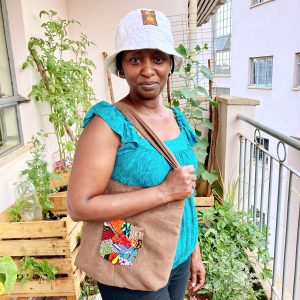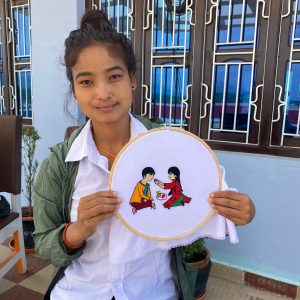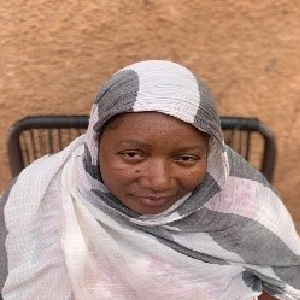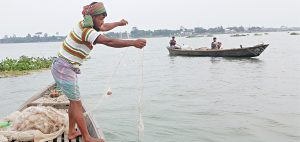2022 Start-ups and Projects
In 2022 The Advocacy Project transferred $63,286 to the seventeen projects and partnerships described below. Most were proposed, designed and managed by our local partners. They included a fishing and nutrition project with River Gypsies in Bangladesh, shown in the photo above.
AP projects fall into three categories: start-ups; phase 2; and long-term. Start-ups last between three and six months. Working remotely from the US or in the field, AP helps the partner to draw up a budget, set goals, and draft an MOU. We also offer up to $1,000 in seed money and help the partner to manage the project through our core team or a Peace Fellow. If the goals of the start-up are met we will help to scale the startup and move to a Phase 2 project (6 months to 18 months). If these goals are met we will work with the partner to develop a long-term program (3-5 years).
Learn more about the Fellows who worked on these projects.
 |
Telling the Story of COVID-19 Through Embroidery
Lisa Jawa, 17, is among more than 200 fiber artists in Zimbabwe, Nepal, the US, Kenya, Uganda and Bangladesh who have used embroidery to describe their experience of COVID-19 for our global COVID story-telling program. Lisa was one of 12 girls who produced stories in Zimbabwe. The project has produced 12 finished advocacy quilts so far. We are producing a catalog of the COVID designs and hope to exhibit the quilts widely. This year, we are providing embroidery training to many of the artists and will offer their embroidery for sale through an online store in the Fall. Our quilting program is managed by Bobbi Fitzsimmons and Abby Hack at AP and funded by Humanity United. |
|
|
|
 |
Use Composting to Grow Food in Kibera, Nairobi
Working with Stella Makena in the settlement of Kibera, Nairobi, AP is supporting an experimental start-up to help women use composting and vermiculture in the informal settlement of Kibera. The project met all of its goals in 2021 by composting over half a ton of kitchen waste and producing 150 liters of worm fertilizer (leachate) which has been bottled ready for sale. Read here for more information. Stella’s team has has formed an association, Shield of Faith, which now serves as AP’s local partner. Using funds from the successful Sister Artists 2 auction, AP will increase our investment in 2022. |
|
|
|
 |
Use Soap To Empower Girls in ZimbabweOur Zimbabwean partner Women Advocacy Project helps 80 girls, including Trish Makanhiwa, to make and sell Clean Girl soap. Their target for 2022 is to produce and sell 16,000 bottles – the same goal that they met in 2021. AP has helped to secure funding for the program from Together Women Rise and will recruit two Peace Fellows to support the program this year. Read our reports on the project to GlobalGiving since 2018 and meet the WAP girls in this video. |
|
|
|
 |
Improve Hygiene and Lift Enrollment in Ugandan SchoolsThis year the Gulu Disabled Persons Union (GDPU) will install a WASH package at the Awach primary school in Gulu district, Uganda with our support. Our goal is to help the school recover after two dispiriting years of closure. We will also help the Clean Wash soap project, featured below, to supply the school with soap. The project is led by Emma Ajok at the GDPU. This will be the fifth school to benefit from our WASH program. Read more about the program and view our movie about the appalling state of toilets in any primary schools. The WASH program is funded by the Prince of Peace Lutheran Church in Dublin, Ohio and the North Kingstown Rotary Club. |
|
|
|
 |
Community Vaccination Campaigns in the Global South
Goutami Sinh was one of four volunteers who helped our Indian partner, Jeevan Rekha Parisad (JRP) (“Lifeline”) to fully vaccinate 876 tribal people against COVID-19 as part of a global program by AP to support community-based vaccination campaigns. The JRP beneficiaries live in two remote villages in the Indian state of Odisha. AP has supported five other vaccination campaigns since the pandemic began in 2020 – in Kenya, Bangladesh, Uganda, Zimbabwe, and Nepal. In all, 4,998 underserved people have received vaccinations with support from AP, opening the way for many to receive a booster through government. Our goal has been to strengthen local medical services against future crises. Read our bulletin. |
|
|
|
 |
Produce Clean Wash Soap for Schools in UgandaAP has invested in a soap start-up led by Freeman, a soap-maker with limited mobility in Gulu. Freeman launched his brand of Clean Wash soap at the height of the pandemic and our support will enable him to produce a year’s supply of soap for the Awach Primary School which has been selected to receive a WASH package by GDPU. The project will receive support from an AP Peace Fellow in Gulu and a second Fellow in the US. |
|
|
|
 |
Support Families of the Disappeared in Nepal
AP has supported the Network of Families of the Disappeared in Nepal (NEFAD) since 2015. As part of this, we have helped family-members of the disappeared, like Kanchan Chaudhary in Bardiya District, to tell their stories through embroidery and produce two memorial quilts, a COVID quilt, and Tiger bags. Kanchan is one of several women who have become excellent fiber artists in the process. Her design shows Kanchan greeting her brother at the Dashain festival with a sprout of maize, known as a jamara. AP will now look for ways of commercializing these embroidered stories on behalf of the artists, while continuing to support NEFAD’s advocacy for transitional justice. Our thanks to 2022 Peace Fellows Therese McCary, Prabal Thapa and Daniel Gurevitch, who have worked on this project this year. Read our bulletin Watch our movie of the memorial quilts being made; view profiles of the artists and read about NEFAD’s advocacy. |
|
|
|
 |
Help Pastoralists in Kenya to Resist Climate Change and ConflictAP has supported Children Peace Initiative Kenya’s successful program to promote peace among pastoralists in Northwest Kenya since 2015. CPIK builds cooperation between pastoralists, which reduces the need to resort to violence and also increases resiliency to drought and climate change as described here. The model has been tested out over ten years of working with the Pokot and Samburu tribes and will now be extended to a broader area. AP recruited two Peace Fellows this summer to work at CPIK – Julia Holladay and Daniel Gurevitch. We hope to nominate CPIK’s inspiring founder, Hilary Bukuno, for a Nobel Peace Prize and support CPIK’s networking through the Alliance for Peace-Building and CPIK’s 501(c)(3) nonprofit in the US. |
|
|
|
 |
Support a Family Sickened by Agent Orange in VietnamAgent Orange has taken a terrible toll on families in Quang Binh province, as it has on millions of other Vietnamese. AP has raised over $17,000 for affected families since 2015 and we hope to support another family in 2022, working with our Vietnamese partner, the Association for the Empowerment of Persons with Disabilities (AEPD). Under our model, we raise funds for a cow. AEPD purchases the cow and follows up with the families through outreach workers (themselves former veterans) to ensure that the cow produces a sustained income from milk, calves and rent. We raised $1,470 for Toa Cao and his wife Luan in 2021. Their three children – Van, Xuan and Ngoc – were born with serious intellectual and physical disabilities. |
|
|
|
 |
Open an online store for embroidery from the Global SouthCaren Mbyaki is one of sixty fiber artists from Zimbabwe, Kenya, Uganda, Bangladesh, Nepal and Zimbabwe who have made embroidery for an online store that AP will open in the Fall of 2022. Caren made an embroidered story for the Women’s World quilt at the ICPD25 conference m Nairobi and emerged as a leader in her settlement, Kangemi during the pandemic. Using funds from AP, she formed an association, The Kangemi Advocacy and Self-Help Group, to produce embroidered squares for Sister Artists 2 and the COVID-story-telling project. Caren’s association has secured legal status and successfully advocated for COVID vaccinations in the overcrowded settlement (below). |
|
|
|
 |
Beekeeping by the Visually Impaired in Uganda
AP has invested in HIVE Uganda which helps persons with visual impairment to learn beekeeping and sell honey. HIVE was founded by Ojok Simon, who also sits on the board of the Gulu Disabled Persons Union (GDPU) and has worked closely with AP Peace Fellows since 2008. Simon lost his sight when he was attacked and beaten by rebels from the Lords Resistance Army and has dedicated his life to empowering others with serious visual impairment. AP is investing $1,062 in five beekeepers, who hope to sell 150 kilos of honey in 2022. |
|
|
|
 |
Empower Survivors of Forced Marriage in UgandaAP is helping Victoria Nyanyjura to launch a startup for women who were kidnapped by the Lord’s Resistance Army and forced into marriage. Years later, many have still not recovered. Victoria’s organization, Women in Action for Women (WAW) has used funding from AP to train ten members in embroidery story-telling. They described their ordeal through powerful blocks, which have been assembled into an advocacy quilt in the US. Victoria is seen in the photo with one of the images. The WAW artists have also produced embroidered blocks for a bread quilt and told the story of COVID through embroidery. AP will train the women to produce embroidery for sale through our new online store. |
|
|
|
 |
Support Women’s Education in AfghanistanThe collapse of the Afghan government, and the withdrawal of Western civil and military forces in 2021 has exposed women and girls to serious risk. AP offered immediate support to the Oruj Learning Center, a partner since 2003 which put 3,470 girls through school between 2003 and 2009 and opened a university in Kabul in 2011. The university continues to support students. against all odds. AP amplified Oruj’s message in 2021 through a news bulletin that was widely read and promoted a fundraiser by Oruj that netted $11,364 in a single day. We will continue to support Oruj’s efforts in 2022 and also work to ensure the safe resettlement of Afghan refugees in the US. |
|
|
|
 |
Improve the Food Security of River Gypsies in BangladeshAP is helping Shahed Kayes, founder of the Subornogram Foundation in Bangladesh, to prevent starvation on the island of Mayadip in the Meghna River while also providing employment for day laborers. Most of the 205 families on Mayadip depend on fishing. (Photo at the top of this page). AP has purchased a fishing boat (Mayadip) for Subornogram that employs 3 crew members from the poorest families on the island for a period of a week. They keep half the fish they catch. The rest is used to pay for a feeding kitchen which provides a cooked meal each day for vulnerable individuals. Read about this exciting and innovative project here. Read how AP helped Shahed to end shocking violence against the Gypsies in the past and learn about Gypsy culture through the River Gypsy Quilt. |
|
|
|
 |
Empower Dishwashers in NepalNeema is one thousands of women and girls who work as dishwashers in Midwest Nepal. Neema’s life is one of exploitation and anxiety. Her work-day lasts up to 16 hours, for which she earns around $4. COVID claimed the life of a daughter, adding tragedy to hardship. There has been little publicity about the plight of dishwashers, but this silence is one reason they are abused. AP will deploy a Peace Fellow to Nepal in 2022 to help our partner, Backward Society Education (BASE) to launch a start-up for dishwashers. The project will offer embroidery training to the women, to be provided by two fiber artists from Bardiya who have themselves been trained by AP. |
|
|
|
 |
Reducing the Threat from Albinism in KenyaAP is helping Daniel Shisia, program head at the Albinism Society of Kenya, to help mothers of children with albinism describe the challenges facing people with the condition, ranging from violence and discrimination to skin cancer. Twenty women have told their story through embroidery, which will be assembled into two advocacy quilts in 2022, exhibited and used by ASK to advocate for protection against skin cancer. AP will also offer the women more embroidery training in 2022 and hopes to support a project to produce and sell bucket hats. |
|
|
|
 |
Launching a peanut processing start-up with survivors of GBV and displacement in Mali
Awa Djobo, 40, was forced to leave Mopti in central Mali by fighting. Now living in Bamako, she is one of five women who have been trained to make and produce peanut paste by AMABE, a nonprofit founded by Mariam Seck, a long-time partner of AP. Mariam’s goal is to sell $1,000 worth of paste by the end of 2022. Half of the profits will be shared by the women and the other hand re-invested in the business. |
|
|
|
|
|
|
|
|

